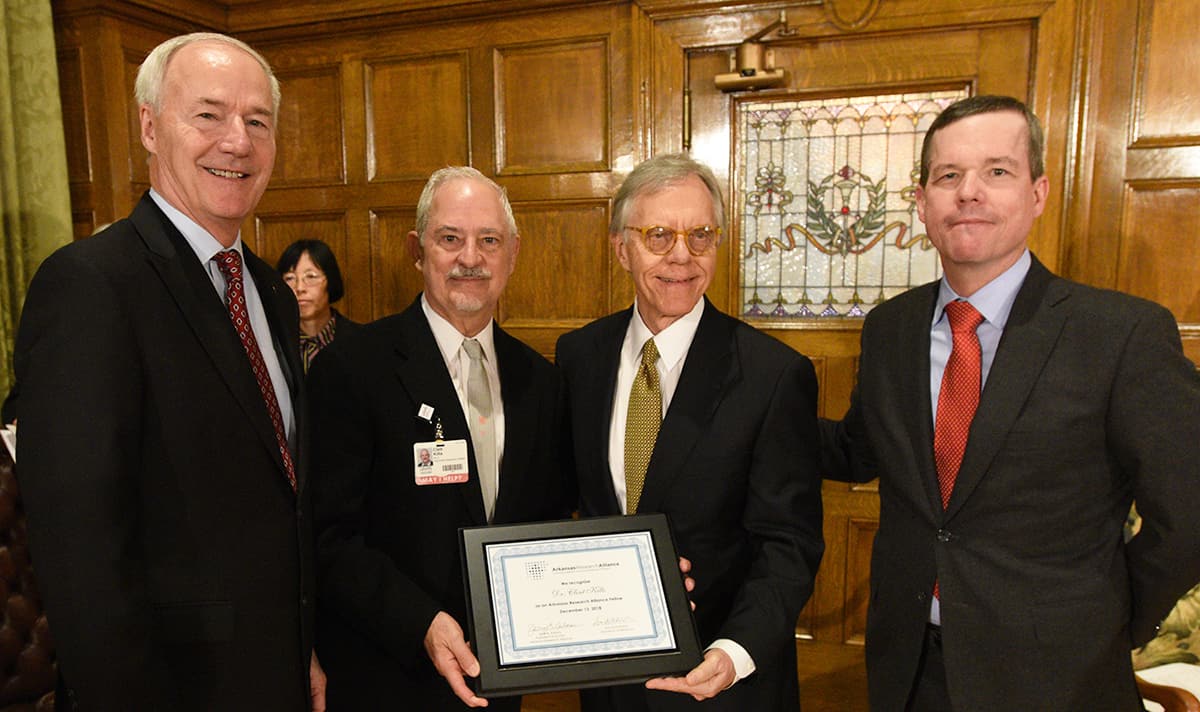UAMS Researcher Clint Kilts Named ARA Fellow
| UAMS researcher Clint Kilts, Ph.D., was named an Arkansas Research Alliance (ARA) Fellow at a news conference today at the State Capitol.
Kilts was presented with a certificate by Gov. Asa Hutchinson, ARA CEO Jerry Adams and UAMS Chancellor Cam Patterson, M.D., MBA. ARA Fellows from university campuses receive a $75,000 grant.
“Dr. Kilts is applying technology to real world problems like drug abuse and prevention, responses to sexual trauma, and dealing with health issues like schizophrenia,” Patterson said. “His research has been groundbreaking providing opportunities to take technology into the community and have a direct impact on people here in Arkansas and across the United States. Clint, congratulations on your accomplishments, and we are so proud of you for being the next ARA Fellow at UAMS.”
Kilts is the founding director of the Brain Imaging Research Center at the UAMS Psychiatric Research Institute, an associate director of the institute and a professor in the UAMS Department of Psychiatry in the UAMS College of Medicine. He holds the Wilbur D. Mills Endowed Chair in Alcohol and Drug Abuse Prevention.
The ARA Fellows program, launched in 2014, recognizes research leaders who are currently working in Arkansas at one of the state’s five research campuses. The program was created to advance the mission of ARA by supporting world-class researchers whose work strengthens the competitiveness of the state through research.
ARA Fellows focus on innovations in biomedical engineering, plant biochemistry, nanoscience, microbiology, nutritional improvements, electronics research and more, often resulting in a direct impact on the state’s economy.
Kilts said he will likely use the grant as seed money for a project to study brain maturation responses in pre-school students served by Head Start as well as a second project.
“I started a community science initiative about a year and a half ago with the idea of having the community direct science,” Kilt said. “If they responded to a broad poll, what would they want us to study? I may use the grant for a community-responsive, community-directed initiative.”
In 2009, Kilts joined the faculty at UAMS. He has a long record of National Institutes of Health-funded research, most recently in functional, molecular and connectivity imaging of the living brain to explore the neural network processing basis of human behavior.
With a focus on drug abuse and addiction, Kilts’ clinical research focuses on the use of neuroimaging technology to define the brain basis of psychiatric disorders and their treatment. His goal as director of the center is to extend magnetic resonance imaging-based technology and human neuroscience to areas of clinical problem-solving in psychiatry and related disciplines.
Kilts received his postgraduate training in psychopharmacology and neurochemistry in the Department of Pharmacology and Toxicology at Michigan State University. He continued his training in neuropharmacology, analytical neurochemistry, and human psychopharmacology in the Biological Sciences Research Center at the University of North Carolina. Kilts has been a member of the faculty and worked as a researcher at Duke University and Emory University School of Medicine.
The other five new ARA Fellows recognized at the news conference and joining the existing ARA Scholars and Fellows are: Nitin Agarwal, Ph.D., University of Arkansas at Little Rock, distinguished professor in the Information Science Department; Jingyi Chen, Ph.D., University of Arkansas at Fayetteville, associate professor in the Department of Chemistry and Biochemistry; Steven Foley, Ph.D., National Center for Toxicological Research, deputy director of the Division of Microbiology; Xiuzhen Huang, Ph.D., Arkansas State University in Jonesboro, professor in the Department of Computer Science; and Mansour Mortazavi, Ph.D., University of Arkansas at Pine Bluff, professor and vice chancellor.
Previously named ARA Fellows from UAMS are Laura James, M.D., director of the UAMS Translational Research Institute; Michael Owens, Ph. D., a professor in the UAMS College of Medicine’s Department of Pharmacology and Toxicology; and Mark Smeltzer, Ph.D., professor in the UAMS Department of Microbiology and Immunology and director of the Center for Microbial Pathogenesis and Host Inflammatory Responses.

